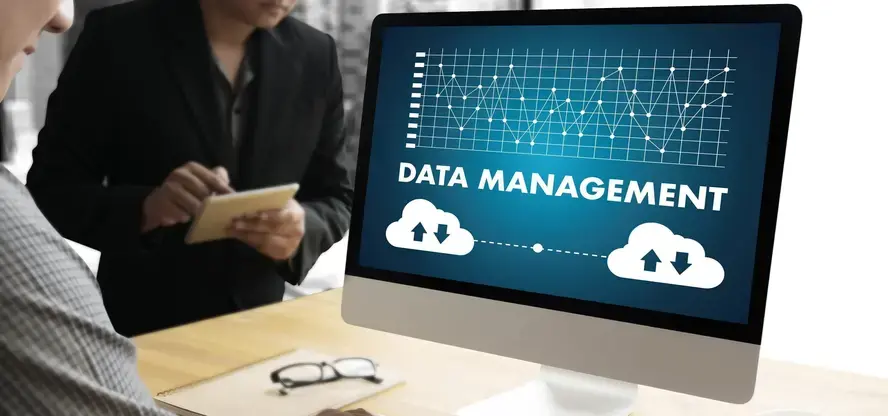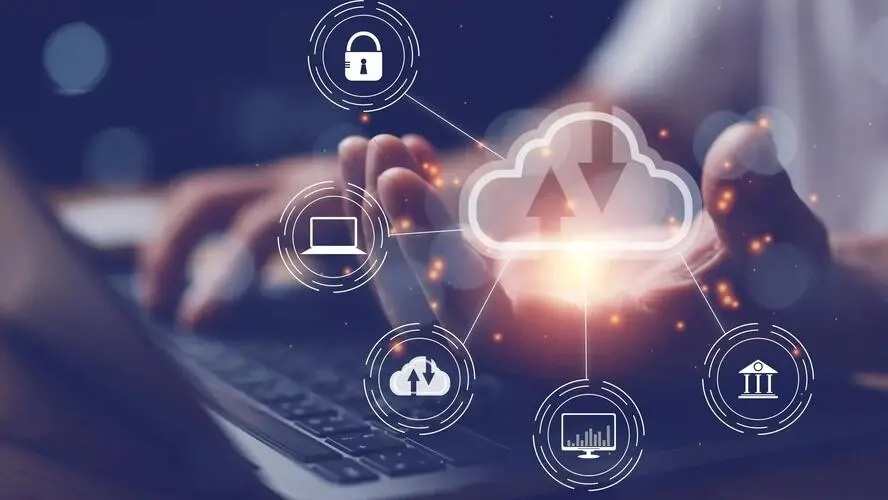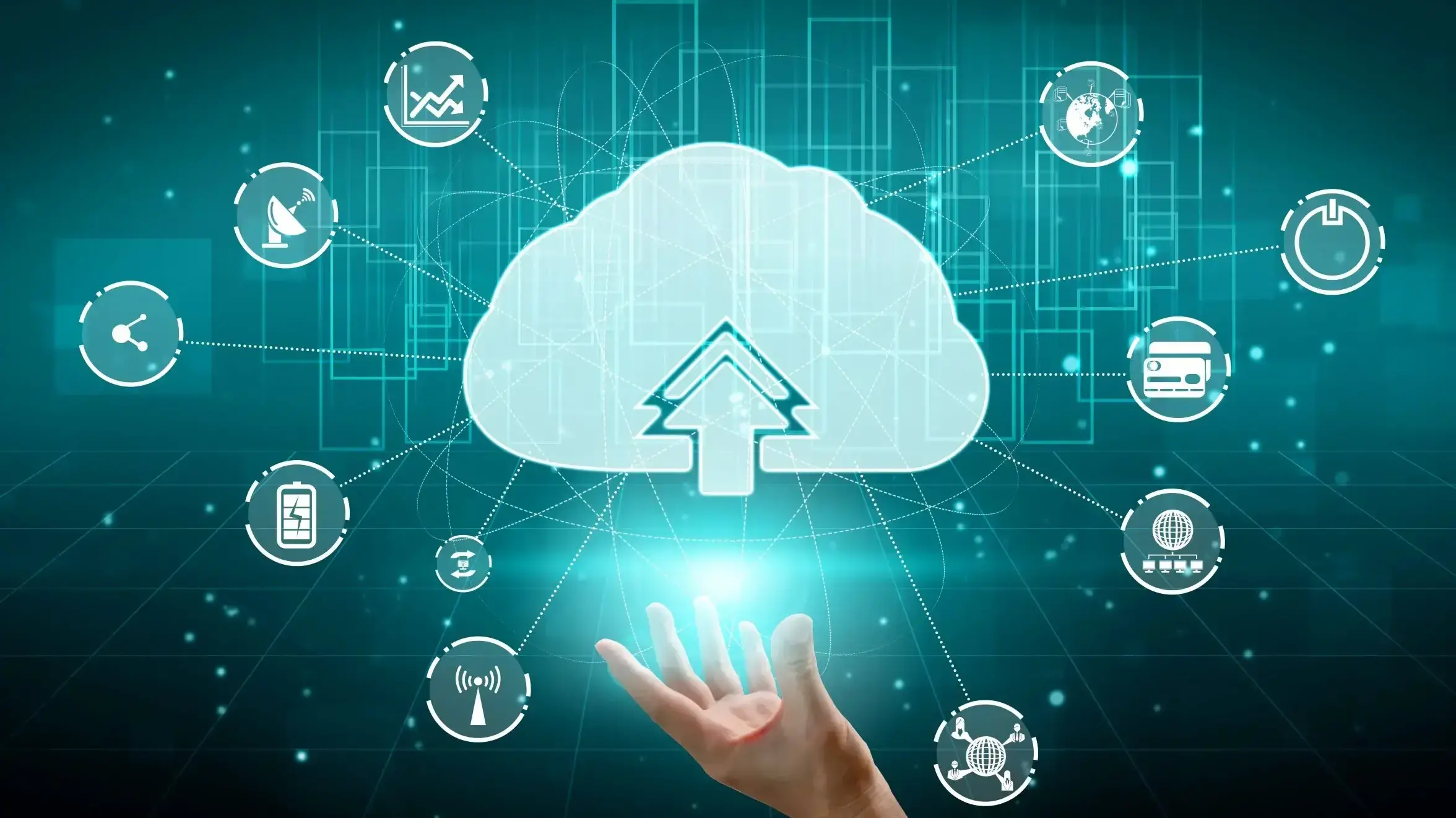The manufacturing industry is under pressure to innovate and adopt new technology. Digital manufacturing, 3D printing/additive manufacturing, digital twinning, the Internet of Things, blockchain, and artificial intelligence are all changing the way manufacturing works.
Cloud computing is another new technology for manufacturers to consider. Cloud computing can help manufacturers stay more connected to their suppliers and their customers. Plus, nearly half of all software that manufacturers use will be cloud-based as well, which means basic operations will require cloud connectivity, or hosting your own cloud system .
What is Cloud Computing?
Cloud computing uses the Internet to connect to servers based in other parts of the world to store software and data. It could mean storing your organization's enterprise resource planning (ERP) software on the cloud, housing your financial information and intellectual property, or using additional computing power to analyze large data sets.
Rather than using individual computers to run all of these operations, connecting them through a network, or even connecting them to a server that's stored somewhere in a manufacturing facility, cloud computing uses large servers that are housed in different parts of the world, and are accessible through high-speed internet connections.
There are three types of cloud computing:
Software as a Service (SaaS)
You're most likely familiar with SaaS. These are the software systems that you don't have to load onto a single computer to use. Everything is web-based and is usually paid for with a subscription although it can be free. Gmail is an example of a SaaS: You don't install it, you access it online, and it's available on your phone, tablet, and laptop. On the paid front, Oracle, NetSuite, Epicor, and Odoo are all SaaS solutions for manufacturers. They all operate in the cloud and are accessed through a web browser.
Platform as a Service (PaaS)
This is a complete cloud-based environment where you purchase the resources — both hardware and software — from a cloud service provider on a pay-as-you-go basis. You don't actually buy anything, you pay a regular subscription for the software and necessary operating system. This helps you avoid issues like depreciation and loss of value, as well as your system becoming obsolete because the cloud provider will maintain and upgrade the system as needed. The platform can also include middleware, business intelligence (BI) services, database management systems, and development tools.
Infrastructure as a Service (IaaS)
IaaS is a smaller part of a PaaS system, incorporating only servers, security software, and a data center/storage. A PaaS includes all that, plus the middleware and BI software, and the necessary operating system. And a SaaS includes all that plus the hosted applications, like ERP software.
In an IaaS, each resource is available as separate pieces, and you only pay for the items you need, adding and removing them as needed. This is ideal for companies that already have the staff and knowledge to install their operating systems, middleware/BI software, and hosted software.
Depending on your manufacturing operation, and the experience of your IT staff, you may want a SaaS, PaaS, or IaaS. There are pros and cons to all three systems, but for the most part, manufacturers prefer the SaaS approach because they would rather focus on being a manufacturer than putting a lot of time and energy into developing an IT staff that's capable of managing an IaaS.
Cloud Computing benefits for manufacturing
Cloud computing has several benefits over individual computers and onsite server rooms.

Cloud-based software has fewer problems than software on individual computers
As anyone who has worked with computers can tell you, they often freeze and shut down because the different applications conflict with each other. They need to be updated, and drivers and patches need to be installed. The IT department can stay busy just trying to keep people's computers working by solving all these updates and patches.
With a cloud computing setup, your most important software is stored on a single remote server and is operated through a person's web browser. There's nothing to conflict with on the users' end because the software is all maintained and updated by the developers. Plus, your IT department is only responsible for managing the security and integrity of the data. They oversee your proprietary information — financial data, customer information, intellectual property — but it's the cloud service provider who maintains the operating system and cybersecurity .
Cloud Computing allows greater flexibility
Companies with multiple departments often run into problems with siloing and compartmentalizing. Different departments become territorial with their information and data and don't always want to share it with other departments.
Cloud-based SaaS will help break down silos and encourage greater collaboration and teamwork. That's because every department will have access to the same information, and will be kept apprised of different changes and updates. Information that changes for one department will change for all departments, and no one else can hoard that information all for themselves.
Cloud Computing costs less
Most companies that maintain their own servers onsite have a separate server room, complete with its own air conditioning system and security system. You'll buy the racks, the servers, the operating software, and the cybersecurity software. You'll hire IT personnel to maintain the system. It ends up being one of your biggest expenses, and manufacturers become IT providers with manufacturing machines, rather than manufacturers with a computer system.
But with cloud computing, the cloud provider manages all of that. They have the rack space, the servers, and the software, and they have the high-level, high-priced IT staff who manage all of it for thousands of companies all at once. They keep things maintained and updated, so you only need one or two IT staff members to manage the small problems in the office.
Since there aren't as many applications needed to run a cloud-based operation — a web browser, word processor, spreadsheet, and presentation software — the IT staff won't be so busy troubleshooting your employee's computers. They can focus on keeping your cloud system fully operational, and you can have a smaller IT staff as a result.
Cloud Computing saves time
As we said before, it takes a lot of time to patch, update, and upgrade a lot of computers throughout a company. And if something goes wrong or breaks down, you have to deal with a lot of downtimes. This can be worse if it's one of your production computers.
But with cloud-based software, the developers do the upgrades themselves, which means you don't have to update each person's individual computer. It's usually done during your company's overnight, so you don't have to deal with being offline during peak business hours.
Cloud Computing enables digital twinning
Speaking of saving time, as more companies embrace digital manufacturing, they're finding that they can achieve optimal, repeatable results if they set their machines to use the same settings. This is called digital twinning, and it allows manufacturers to transfer settings between machines so they can all achieve the same results.
This means you can create digital twins in the same building, in the same country, or halfway around the world, in a few seconds.
Cloud Computing is scalable

Sometimes it's necessary to analyze big datasets, which are beyond the capabilities of normal desktop and laptop computers. The obvious answer is to buy big servers that are capable of analyzing that much data in a short period of time.
But what if you only need that much computing power a few times per year, or even just once a year? With cloud computing, you can expand your processing and storage capabilities with a few clicks of the mouse, often for a few cents per GB of processing power.
You just upgrade the system, pay for the increase, and when you're finished after a few days, shut it off again. You won't be charged beyond the amount of time you use the system and you don't have to buy servers and rack systems that you're only going to use once or twice a year.
Cloud Computing can improve analysis and forecasting
Digital manufacturing machines can collect 40,000 pieces of data or more in a single 8-hour day. However, that data needs to be collected, stored, and analyzed on a regular basis. While you can store it all on a local computing system, there will eventually be too much data for the system to manage. A cloud computing system can manage mountains of data, analyze it, and provide reports on the results.
Plus, the data collected can help inspectors know whether each piece has been built to the appropriate specs and will pass the necessary requirements. And if there's a failure, the data can help investigators know which pieces, which operator, and which day. This is called product tracking and tracing, and it starts in the manufacturing plants by analyzing the raw materials and the completed products. Manufacturers need to be able to show all of the data associated with manufacturing each of those parts, as it can help them avoid lawsuits, recalls, and government penalties.
Cloud Computing is more secure
Major cloud providers — Google, Microsoft, AWS (Amazon) — have the most advanced and most expensive cybersecurity software available. This software is only available to the largest companies in the world just because of the sheer cost. But it's available to anyone who uses a cloud service provider with space on one of those systems.
This cybersecurity software uses machine learning and artificial intelligence to learn how to repel cyberattacks. Once it experiences an attack, it analyzes it, learns how to repel it, and even learns how to repel similar attacks. The more attacks it experiences, the smarter the system gets. The system experiences thousands of attacks every hour, which means it's constantly learning and getting better.
But even if smaller companies had access to this level of software, they would be more prone to attacks because the software would not have learned as much as the large cloud providers. That's because a manufacturer's internal servers aren't exposed to as many attacks as the big providers. A small server may only experience a few thousand attacks per year, but a large server will experience that many in an hour.
As a result, the software hasn't had a chance to learn, which means it's not as powerful, and the AI system can't learn as quickly. This makes the small servers more prone to simpler attacks, data breaches, and IP theft.
Cloud Computing is more secure, part 2
Many executives like onsite computer servers because they feel like the servers are more secure than unseen servers "out there, somewhere." They can see the servers, behind the locked doors. They know there's a security system in place to prevent unauthorized users from entering the server room. And they know that as long as there's a security system in place, no one can get to their data.
This is all true, except your criminals are not going to enter your building, they're going to enter through an internet connection. They don't need to be in the building at all. In fact, they're probably not even in the same country.
That's because every computer is in the cloud. Your laptop is the cloud. Your colleague's laptop across the room is the cloud. Your favorite news website is the cloud. Any website you visit is the cloud. Even the website where you're reading this article is the cloud.
Which means no amount of physical security or security keypads will keep them out. They only need to get past your firewall and security system, which, if you're using a cloud server, is nearly impossible. Not so with your onsite server system.
Manufacturers can benefit from cloud computing. They can share and analyze more data, they can safely store their intellectual property, and they can store data collected during the manufacturing process. Plus they can manage their employee data and streamline HR's hiring and onboarding processes. If you would like to learn more about cloud computing for manufacturing, please contact us for a free demonstration.
Frequently Asked Questions
Will cloud hosted websites be backed up?
Yes, Verpex performs daily backups of all sites hosted.
How many websites can I host in the cloud?
Our cloud hosting packages allow up to 10 websites to be hosted simultaneously.
How easy is it to increase bandwidth on cloud servers?
Incredibly easy. Since you’re in a pool of other servers you can draw on those resources at any time. If you need to increase your bandwidth or storage limits just give us a call and it can be done instantly.
How easily can I switch between VPS and cloud hosting?
Generally, there shouldn’t be an issue when switching. However, if you’ve done a lot of heavy customization to your VPS solution you might find making the switch a little more time-consuming.

Erik Deckers has been a professional blogger since 2009. He is the co-author of Branding Yourself, No Bullshit Social Media, and The Owned Media Doctrine. He published his first humor novel, Mackinac Island Nation, in 2019. Erik has been blogging since 1997, and a newspaper humor columnist since 1994. He has written several radio and stage plays, and numerous business articles. Erik was the Spring 2016 writer-in-residence at the Jack Kerouac House in Orlando, FL, and now serves on their board of directors.
View all posts by Erik Deckers



















